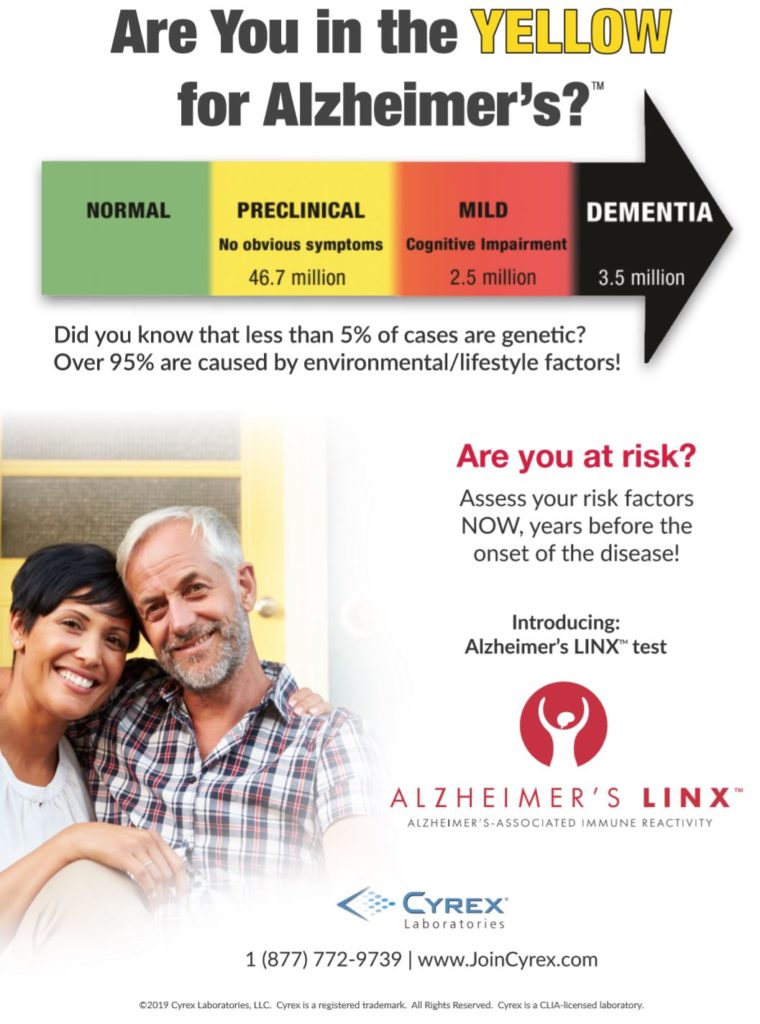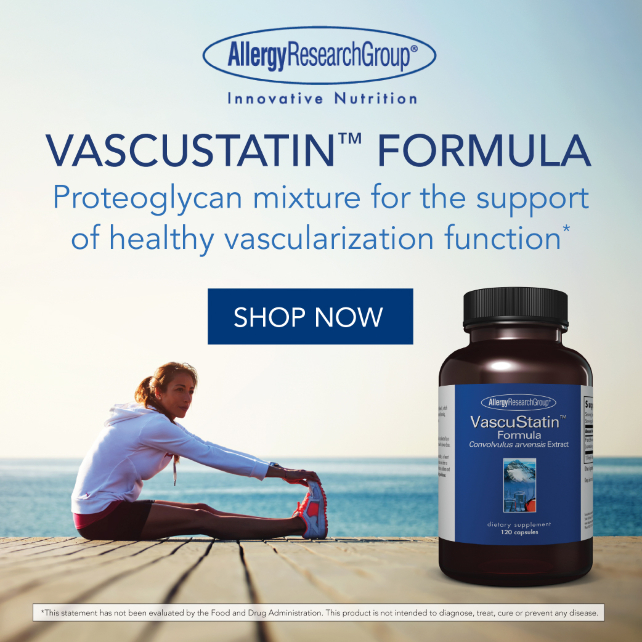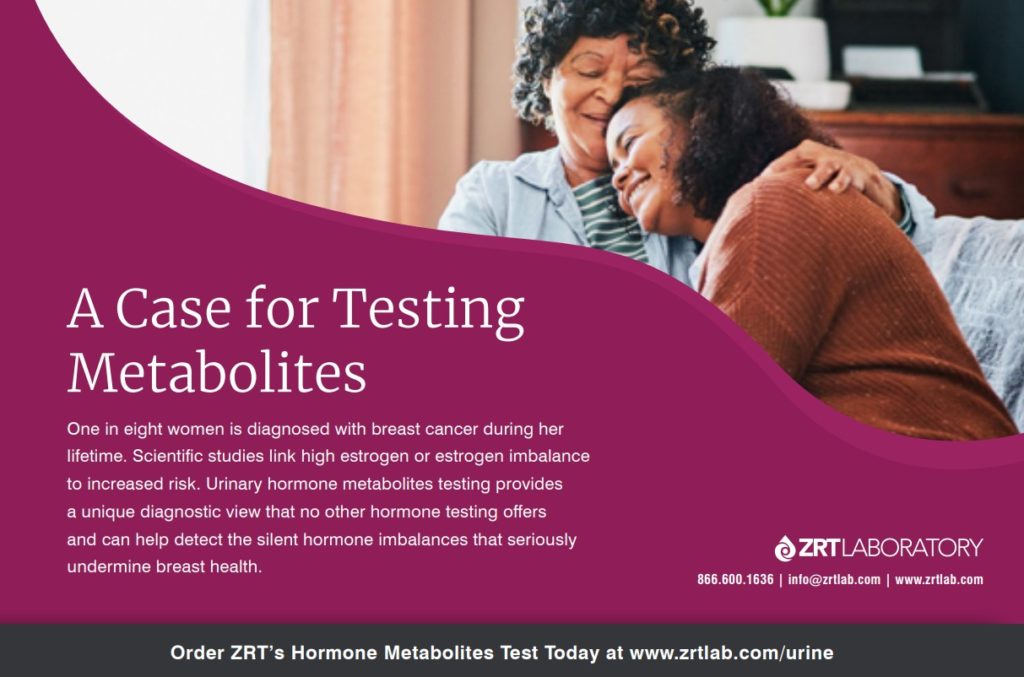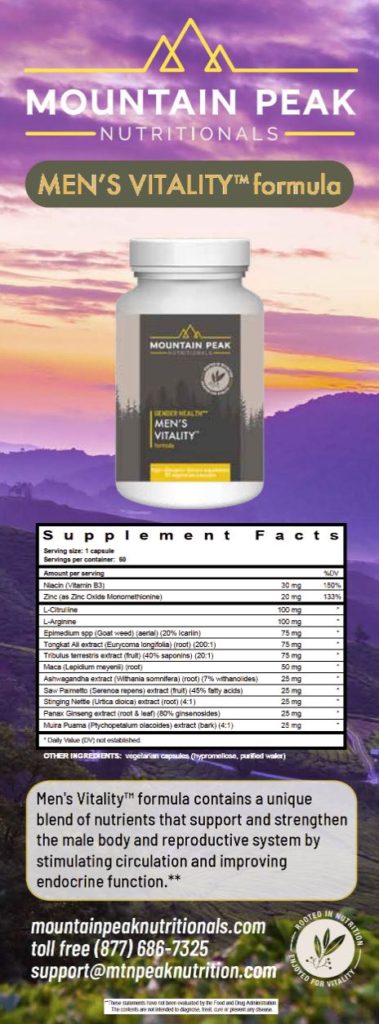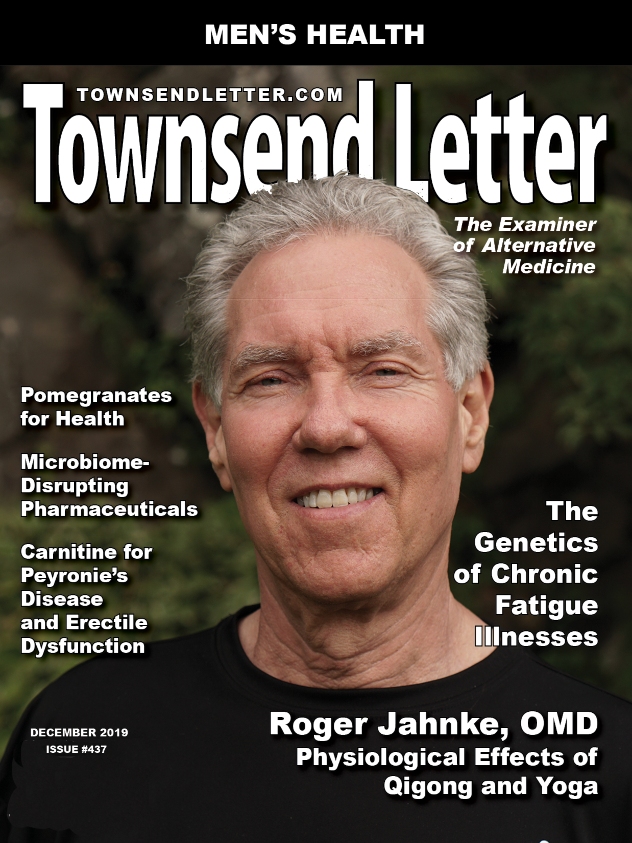By Geo Espinosa, ND, LAc
Testosterone is a cholesterol-derived hormone in the body responsible for male sexual differentiation. It is tightly bound to sex hormone-binding globulin and loosely bound to albumin; about 2% is free and bioavailable.
As a man ages, a steady decline in testosterone production or bioavailability, via several pathways, can happen. One, peripheral aromatization can occur resulting in the conversion of testosterone to estrogens. Two, testosterone binds the androgen receptor (AR) on the cell nucleus to produce proteins for cellular function. Three, testosterone undergoes conversion to 5α-dihydrotestosterone (DHT), a more potent androgen, by the enzyme 5α-reductase.1
For close to seven decades, it’s been thought that testosterone (or its metabolites) “is the gasoline that lights the prostate cancer fire.”
Briefly, prostate cancer is the fifth leading cause of death from cancer in men, with an estimated 307,000 deaths representing 6.6% of total male cancer mortality. This estimate accounts for 15% of the cancers diagnosed in men, with almost 800,000 occurring in more developed regions. The likelihood of developing prostate cancer increases with age with the average age at diagnosis being 66 years.2
The notion that testosterone participates in prostate cancer development is counterintuitive as most men have a decline in testosterone as they age. That would mean that the highest rate of prostate cancer is 25 years old, not 66.3
So, then why do many still think higher testosterone increases prostate cancer risk?
Let’s begin with a little history.
A Short History of the Testosterone/Prostate Cancer Confusion
It all started with the work of Dr. Charles B. Huggins, an urologist at the University of Chicago, circa 1940.
Dr. Huggins began experimenting on the effects of castration on dogs with enlarged prostates (BPH). (After all, dogs are the only non-human animals we know of that naturally develop prostate problems.) Huggins observed that the dogs’ prostates shrunk after castration. But that was not all he observed. Dr. Huggins also noticed that dogs with cancerous-appearing areas also demonstrated prostate shrinkage. When their prostates were removed, the cancerous areas cleared up.
Low testosterone levels are associated with more aggressive prostate cancer and higher Gleason scores.
As an experiment, Huggins and his research team then removed the testicles or applied estrogen to a group of men who had metastatic prostate cancer to their bones. At the time the PSA test did not exist; and a blood test called acid phosphatase, typically high in men with prostate cancer that had spread to their bones, was used to determine the progression of the disease. Indeed, Huggins and his team showed that acid phosphatase dropped substantially within days of lowering testosterone; and injecting testosterone into men with prostate cancer caused acid phosphatase to rise. They concluded that reducing testosterone levels caused prostate cancer to shrink and that raising testosterone levels caused it to grow.4
Is Testosterone the Fuel for Prostate Cancer?
In test tubes, testosterone demonstrates an increase in prostate cancer in numerous cancer cell lines but apoptosis (programmed cancer cell death) once androgens are removed.5
A similar response is found in rat studies: androgens promote tumor progression until androgens are withdrawn – then causing regression of prostate tumor cells.6
From test tubes and rat studies, one can easily think, “that’s it, case closed. Testosterone fuels prostate cancer, thus low testosterone in men is best for prostate cancer prevention.” But in analyzed human studies lies the paradox.
A meta-analysis of three prospective studies controlling for testosterone, estradiol, sex hormone binding globulin (SHBG), age, and body mass index (BMI) demonstrated an increase in prostate cancer for men in the highest levels of serum testosterone but no association with DHT or estradiol.7
Another meta-analysis called the Endogenous Hormones and Prostate Cancer Collaborative Group included 3886 men diagnosed with prostate cancer and 6438 controls. The results demonstrated no direct association between endogenous serum androgens and the development of prostate cancer.8
Yet another, well-designed human clinical trial looked at 3255 men in the placebo arm of the Reduction by Dutasteride of Prostate Cancer Events trial, also known as the REDUCE trial. Prostate biopsies performed at two and four years revealed no relationship between testosterone or dihydrotestosterone (DHT) levels and prostate cancer risk.9
Here’s the kicker: not only is there no causal relationship with high endogenous testosterone and prostate cancer, but low testosterone may cause the disease.
One such clinical trial demonstrated a high incidence rate of aggressive, more deadly type of prostate cancer among men with low testosterone defined as >7.6nmo/l (220ng/d).10
Similarly, a group of Chinese men, 110 total, showed greater high-grade prostate cancer (higher Gleason score) in men with low testosterone.11
Beyond analyzing staging with Gleason grade on biopsy, a high-risk disease has been associated with low testosterone after prostatectomy. For example, almost 700 men undergoing prostatectomy had their morning testosterone levels taken with surgical pathology outcomes and observed a significant risk of advanced disease that included seminal vesicle invasion in severely hypogonadal men.12
Where Are We Now?
It is apparent, based on research, that optimal levels of testosterone do not induce prostate cancer but protect against it. Optimal levels, based on my experience, are a total between 600 to 800 ng/dl with SHBG levels no higher than 40 to 50 nmol/l.
Moreover, higher estrogen levels in aging men might be a contributing factor as shown in some studies.13 This hypothesis is inconclusive as other studies suggest no association between estrogen and prostate cancer.14 The role of estrogen in prostate cancer development and progression is complex and multifactorial, incorporating more than one of the mechanisms already described and with interplay between them.
Lastly, some patients can benefit from testosterone therapy after prostate cancer diagnosis. One meta-analysis looked at about 2300 men with low risk prostate cancer (≤ Gleason 6) who underwent testosterone treatment and showed short-term safety with no prostate cancer progression regardless of route of administration.15
Testosterone replacement therapy after prostate cancer diagnosis is a viable option in hypogonadal men, but such patients need close monitoring by a knowledgeable physician to assure against cancer progression. As always, natural and lifestyle options to increase testosterone and overall health, particularly in men with prostate cancer history, should be exhausted before considering exogenous testosterone use.

Dr. Geo Espinosa is a naturopathic doctor, licensed acupuncturist, and certified functional medicine practitioner recognized as an authority in holistic urology and men’s health. He is faculty and holistic clinician in urology at New York University Langone Medical Center and faculty at the Institute for Functional Medicine (IFM). As an avid researcher and writer, Dr. Geo has authored numerous scientific papers and books, including co-editing the book Integrative Sexual Health, and author of the best-selling prostate cancer book, Thrive, Don’t Only Survive. Dr. Geo is the chief medical officer (CMO) and formulator at XY Wellness, LLC, and lectures internationally on the application of science-based holistic treatments for urological conditions. In his free time, he enjoys writing on his popular blog, DrGeo.com, spending time with his wife and three kids, and practicing the Israeli martial art, Krav Maga.
References
1. Brambilla DJ, et al: The effect of diurnal variation on clinical measurement of serum testosterone and other sex hormone benign prostatic hyperplasia levels in men. J Clin Endocrinol Metab. 2009; 94: 907-913
2. Cancer Stat Facts: Prostate Cancer. National Cancer Institute. Available at https://seer.cancer.gov/statfacts/html/prost.html. Accessed: February 23, 2018.
3. Welliver RC, et al: Validity of midday total testosterone levels in older men with erectile dysfunction. J Urol. 2014; 192: 165-169.
4. Huggins C, Hodges CV. Studies on prostatic cancer, I: the effect of castration, of estrogen and of androgen injection on serum phosphatases in metastatic carcinoma of the prostate. Cancer Res. 1941; 293-297.
5. Schwab T, et al. Phenotypic characterization of immortalized normal and primary tumor-derived human prostate epithelial cell cultures. Prostate. 200; 44: 164–171.
6. Ahmad I, Sansom O, Leung H. Advances in mouse models of prostate cancer. Expert Rev Mol Med. 2008; 10: e16.
7. Shaneyfelt T, et al. Hormonal predictors of prostate cancer: a meta-analysis. J Clin Oncol. 2000;18: 847.
8. Roddam AW, et al: Endogenous sex hormones and prostate cancer: a collaborative analysis of 18 prospective studies. J Natl Cancer Inst. 2008; 100: 170-183.
9. Muller R, et al. Serum testosterone and dihydrotestosterone and prostate cancer risk in the placebo arm of the reduction by dutasteride of prostate cancer events trial. Eur Urol. 2012; 62: 757–764.
10. Lane B, et al. Low
testosterone and risk of biochemical recurrence and poorly differentiated prostate
cancer at radical prostatectomy. Urology. 2008; 72: 1240–1245.
11. Dai B, et al. Low pretreatment serum total testosterone is associated with a high incidence of Gleason score 8–10 disease in prostatectomy specimens: data from ethnic Chinese patients with localized prostate cancer. BJU Int. 2012; 110: E667–E672.
12. Salonia A, et al. Preoperative hypogonadism is not an independent predictor of high-risk disease in patients undergoing radical prostatectomy. Cancer. 2010; 117: 3953–3962.
13. Barrett-Connor E, et al. A prospective, population-based study of androstenedione, estrogens, and prostatic cancer. Cancer Res. 1990;50(1):169–173.
14. Wiren S, et al. Androgens and prostate cancer risk: a prospective study. Prostate. 2007;67:1230–1237.
15. Cui Y, et al. The effect of testosterone replacement therapy on prostate cancer: a systematic review and meta-analysis. Prostate Cancer Prostatic Dis. 2014 Jun;17(2):132-43.

